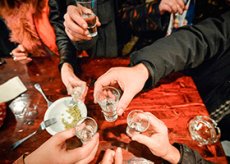New publications
Alcoholic beverages may improve memory and promote learning
Last reviewed: 02.07.2025

All iLive content is medically reviewed or fact checked to ensure as much factual accuracy as possible.
We have strict sourcing guidelines and only link to reputable media sites, academic research institutions and, whenever possible, medically peer reviewed studies. Note that the numbers in parentheses ([1], [2], etc.) are clickable links to these studies.
If you feel that any of our content is inaccurate, out-of-date, or otherwise questionable, please select it and press Ctrl + Enter.

A new discovery by scientists: it turned out that drinking alcohol after receiving new information optimizes its reproduction. This unexpected fact was discovered by specialists from the University of Exeter.
Previously, scientists were sure that alcohol blocks brain activity and prevents the memorization of new information - while it was believed that the memorization process resumes only the next day after drinking alcohol.
"The idea is that the hippocampus, the part of the brain that is important for memory and learning, needs to be switched from short-term to long-term memory before new information can be absorbed," explains the theory behind the discovery, author Celia Morgan, a psychopharmacologist at the University of Exeter.
According to scientists, quite a lot of different data about the influence of alcohol on memorization processes was previously published. It was generally accepted that people "under the influence" lost the ability to restore events in memory. But, as it turned out, this process is connected with the sequence of actions.
"If new information is provided to the brain before a person takes a dose of alcohol, then its perception is easier. We were able to demonstrate this phenomenon in natural conditions, and not in the laboratory - directly in the places where the participants live," says the professor.
To carry out the work, the researchers recruited 88 volunteers aged 18-53. All participants were divided into two categories - those who drink alcohol and those who do not. All volunteers had to learn a certain text in a calm environment, at the same evening hour. After the lesson, the representatives of the first group had to drink an alcoholic drink, and the participants of the second group drank mineral water.
The next day of the study – approximately 18 hours after the lesson – the participants took tests, voicing the learned text. The following results were obtained: the representatives of the first group coped with memorizing the text significantly more successfully. Moreover, the greatest memorability was found in the participants who “took” the most alcohol. “We believe that alcohol activates neural structures in an incomprehensible way,” explains Dr. Morgan. In addition, the scientists do not deny the influence of the rest effect – after all, the testing was conducted in the morning, when all participants in the experiment were well rested and slept. What role sleep plays in this process is still unknown.
Scientists conducted the following experiment: the same volunteers tried to perceive new information, but this time while drinking alcohol. This time the testing was simple: after drinking the drink, the participants were shown different images on the monitor. The next morning, the participants had to recognize these images. Interestingly, the test results for the representatives of the two groups were the same - the number of recognizable images was minimal. Therefore, the order matters: first - receiving information, and then - drinking alcohol.
It is not yet known how exactly scientists will use the results of this discovery.
Details of the experiment are published in the journal Scientific Reports.

 [
[